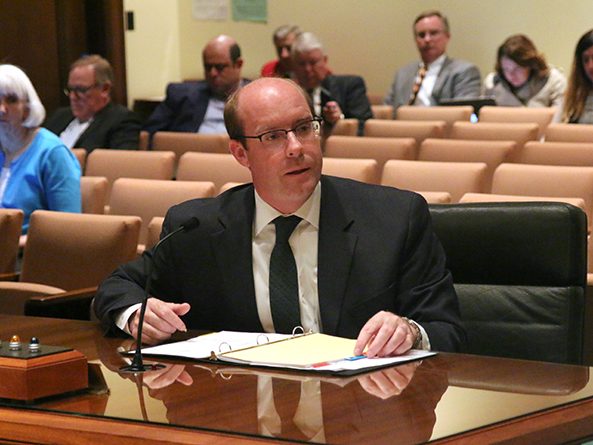Revamped business tax credit program proposed
The Revenue Committee heard testimony March 8 on a bill that would replace Nebraska’s current business tax incentive program.
LB557, introduced by Sen. Burke Harr of Omaha, would replace the current Nebraska Advantage Act with the Great Opportunities Nebraska Act, a system of tax credits for businesses meant to encourage new companies to relocate in Nebraska and to retain and expand existing businesses.
Harr said the new program would have a simpler application process than the Nebraska Advantage Act and would give companies a clearer understanding of what requirements they must meet to receive tax credits.
“What this bill is meant to do is provide clarity and consistency so that when a business is promoted to come here they know what they should and shouldn’t do and they know what is expected of them,” he said.
Harr said the new program focuses on attracting high-wage jobs to the state, which he said would be an effective way to grow Nebraska’s economy at a time of almost full employment and a large budget deficit.
Like the Nebraska Advantage Act, the new program would use a tiered system of credits based on a business’ level of investment and the number of jobs it creates. Credits would be in the form of investment credits, sales tax refunds, property tax exemptions or compensation credits based on an employee’s hourly wage.
The new act would create an additional seventh tier of credits that could be granted to companies investing at least $1 million and hiring at least five new employees at 150 percent of the state median hourly wage or by hiring 10 new workers at that wage level.
Businesses eligible for a credit under LB557 would include those in agricultural research and development, manufacturing, data processing, financial services, warehousing and distribution, software development, renewable electricity generation and others.
The state tax commissioner would have 30 days to review applications for the credits and an additional 10 days to offer a written agreement on the project after the application is approved.
The tax commissioner also would be required to submit an annual report to the Legislature that would include a list of agreements signed during the previous year, the amount of credits used, the number jobs created, projected state revenue gains and losses as a result of the program and other information.
The state Department of Revenue estimates that state tax revenue would decrease by $9.6 million in fiscal year 2018-19 if the bill is passed. By FY2027-28, state tax revenue would decrease by approximately $219 million.
Randy Thelen, senior vice president of economic development at the Greater Omaha Chamber of Commerce, testified in support of the bill. He said the Nebraska Advantage Act’s complexity makes it difficult for companies to apply for credits and ultimately makes the state less competitive when trying to attract new businesses.
“Simplicity sells,” he said. “This is a complex program for us to sell.”
Phil Kozera, executive director of Bio Nebraska Life Sciences Association, also testified in support of the bill. Kozera said Nebraska’s biotechnology sector is poised to become a driving economic force because of the state’s agricultural expertise, low energy costs and good transportation infrastructure.
“When we look at competitive advantages that we have, that final piece … that’s missing in our expansion and recruitment of these types of companies is a competitive incentive package,” he said.
Biotechnology companies make large capital investments and create high-paying jobs, Kozera said, but most do not create enough jobs to qualify for credits under the current incentive program. Those companies would qualify for credits under the new program’s Tier 7, he said.
Renee Fry, executive director of the OpenSky Policy Institute, testified in opposition to the bill. Fry said recent research found little correlation between business incentives and unemployment or economic growth. The research also found that Nebraska’s business incentives are 79 percent higher than the national average and that the state could reduce its incentives by $80 million and remain competitive with other states, she said.
Fry also expressed concern that the proposed program, which has no sunset date, could strain the state’s budget in the future.
“We’re really concerned that LB557 might expand our obligations without having a clear benefit for the state,” she said.
The committee took no immediate action on the bill.


